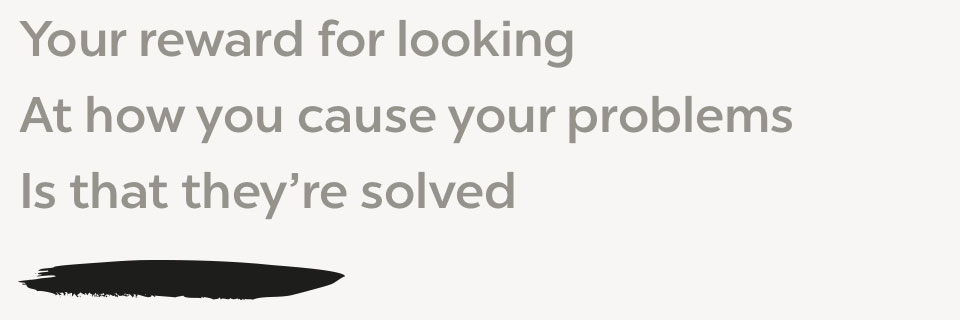Let’s talk about “employee problems.”
Because they’re bullshit.
There’s no such thing as an employee problem. I’ll explain.
Last week in part two, I offered a simple question as a tool to create engagement for employees:
“What don’t you like about yourself, and how can I help you use your job to change it?”
A colleague of mine pointed out that I hadn’t addressed that leaders ought to ask this of themselves first, and that the question won’t work otherwise.
Duh.
I assumed that was obvious, but it’s not to most people; thus spawned part three of this series.
The vast majority of the time, employee problems are significantly manifestations of the manager’s issues. A manager has no right to complain about negative behaviors of their people that they themselves embody and are not actively working on.
I hear all the time:
“My people don’t listen.”
Do you?
“My people don’t own their responsibilities.”
Do you?
“My people aren’t accountable.”
Are you?
I’ve worked with thousands of people, and I’ve never seen an exception to this. Whatever is bothering you about your people–you have a version of it.
If you’re managing well, your people are either evolving or on their way out. If you’re managing poorly, you enable employees to stagnate themselves and your business. The latter is the primary cause of mediocrity. Stagnating people don’t produce excellent results. Period. When managers say they have “employee problems” they’re usually talking about this kind of stagnation, but because they’re stagnating themselves, they let it persist. Then they tell themselves like, “It’s hard to find good people” or “It’s the nature of the industry” or “What if I can’t find anyone better?” which is all bullshit to justify the mediocrity they’re not only tolerating, but actually leading.
Your biggest complaints about your people are first and foremost an invitation to look at yourself. If you cannot find the correlation between your outer circumstance and your inner pattern, ask three people closest to you for their honest opinion. Only then can you address the issue integrity, with an expectation of a decent result.
What tends to happen instead is that managers outer-direct their frustration, perhaps even fire an employee, and then recreate the entire situation. Rinse and repeat until you learn your lesson.
I’ve seen it go on for years.
What’s tricky about this is that usually the manager is more evolved than their employee, but you must look at it relative to the position.
Do you have an employee who avoids discomfort in their job, causing stagnation?
But do you avoid discomfort?
You might not avoid the uncomfortable parts of their job, but what about the uncomfortable parts of yours?
For example, I rarely meet a small business owner who budgets. Maybe nobody told you, but that’s your job regardless. And it was your responsibility to figure it out without being told, that’s what being a leader is about. Yeah, I know it’s tough. Have you ever heard an employee say, “But nobody told me!” and you thought “Nobody should have had to”?
It’s also your job to have uncomfortable conversations with people as soon as you recognize negative patterns of behavior, not let them fester, unconsciously rewarding your people and making it more likely that they’ll never change. In other words, that’s how you create employee problems.
Do you avoid holding people accountable? Every manager I’ve ever talked to does.
This is your contribution to their lack of accountability.
I know. Leadership is a bitch. If you started or bought a business because you thought it would be less responsibility than having a job, I’m so sorry nobody told you it was the opposite.
But here you are, so now what?
Employee Problems Begin With You
There are two kinds of leaders: ones who play victim to employee problems and blame everyone but themselves, and ones who get this principle so deeply–that all of your outsides are a reflection of your insides–that they make their work a personal growth practice.
You have the freedom to choose either, of course. They’re both difficult, but the latter takes you to your own fulfillment. Victimhood takes you only in circles.
Because that’s the direction bullshit goes in. Have you noticed?
So do you want to be held accountable for your bullshit? Or do you just want to dish it out? The Clear and Open Community is a group of people who cares so much about each other and the truth that we’re not afraid to call each other on bullshit. Try a month and see how you like it. If you think it’s bullshit, I’ll give your money back. Want a month for free? Email me about some bullshit you’re ready to give up–inspire me to want to help.


